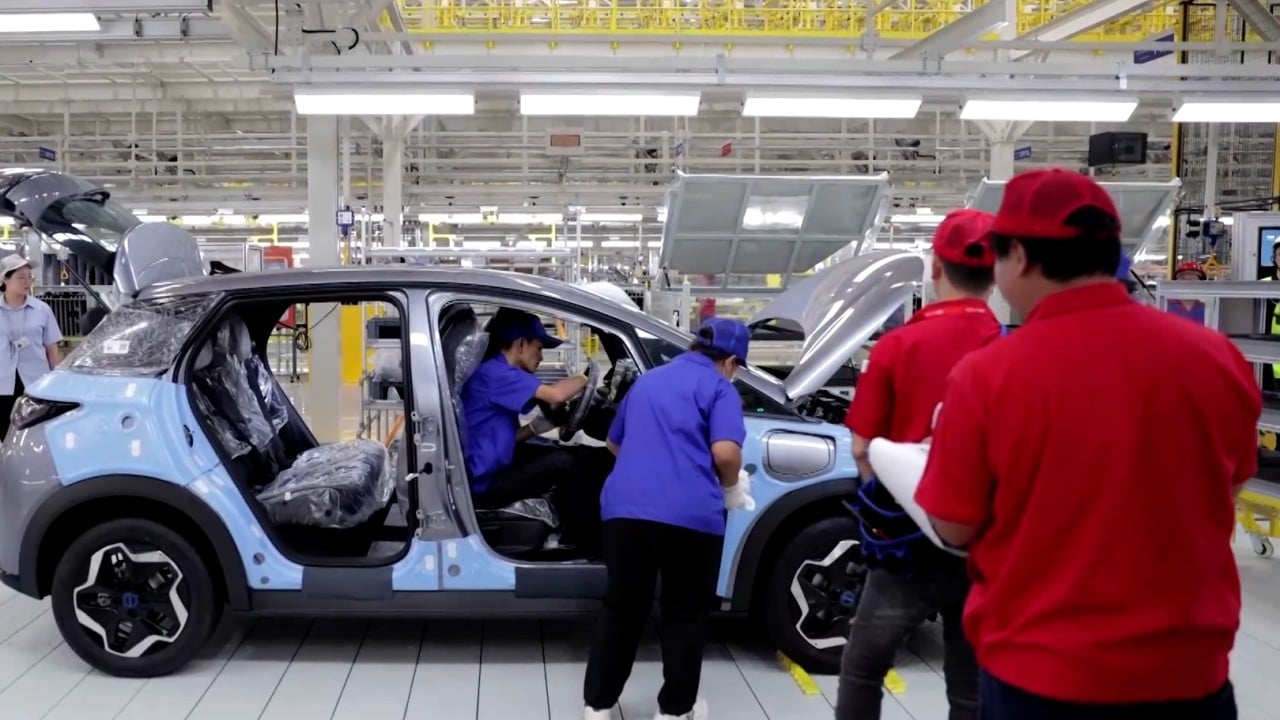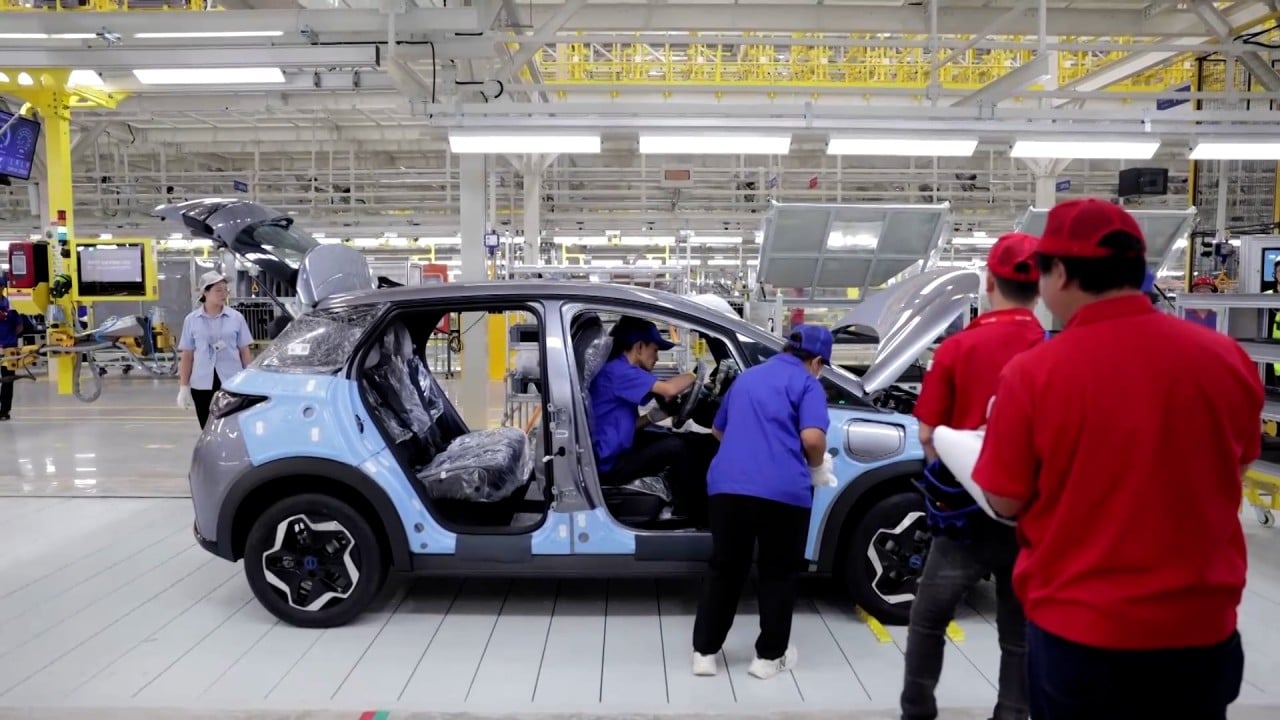Chinese investment in electric vehicles and new energy in Morocco has “exploded”, according to Beijing’s envoy to the North African country, as companies hope to circumvent tariffs and other import restrictions imposed by the US and Europe.
Chinese ambassador to Morocco Li Changlin said that the country had “become a new hotspot for Chinese companies to invest overseas”.
Construction on a Chinese-backed manufacturing and technology hub is progressing well, according to Li, who visited the Mohammed VI City for Science and Technology last month.
During the visit, Li noted that the US$1 billion tech hub in Tangier, which will host hundreds of Chinese companies, is “an important symbol of the high-quality joint construction of the ‘belt and road’ between China and Morocco”, a reference to the Belt and Road Initiative, Beijing’s plan for global trade and infrastructure.
Observers said Morocco’s proximity to Europe, abundance of critical minerals, and free-trade agreements with both the European Union and the US have attracted a growing number of Chinese companies that have pumped billions of dollars into building electric vehicle battery and EV manufacturing plants.
“Chinese companies have invested heavily in Morocco’s renewable energy, new energy vehicle batteries and other fields, playing a positive role in promoting Morocco’s energy transformation and the development of the automotive industry,” Li said at the tech park, which is being built by Chinese companies led by China Road and Bridge Corporation.
The Chinese envoy also visited the site of BTR Morocco in the Tangier tech city, where Chinese battery maker BTR New Material Group is building a US$300 million cathode factory.
Morocco has a free-trade agreement with the United States, and Chinese companies in the North African country are reorganising their operations to enjoy incentives under Washington’s Inflation Reduction Act.
The US$430 billion law is aimed at fighting climate change by giving tax credits to consumers who buy EVs.
Morocco also has a free-trade deal with the EU, which Chinese companies can use to bypass tariff barriers.
The EU announced in June it would impose additional duties of up to 38.1 per cent on electric vehicles from China to protect the bloc’s auto industry from what it has called “market-distorting subsidies” from the Chinese government.
A month earlier, the US imposed 100 per cent tariffs on Chinese-made electric vehicles.
Morocco, strategically located at the crossroads of Africa and Europe, has attracted multibillion-dollar investments into its battery and EV industries.
Among these was a US$1.3 billion deal by Chinese-German battery-maker Gotion to build a gigafactory in the country. Gotion expects to begin production at the plant in the third quarter of 2026 with a battery capacity of 20 gigawatts hours (GWh) per year.
Chinese battery parts maker CNGR Advanced Material announced in September it was teaming up with Moroccan private investment fund Al Mada to build a US$2 billion industrial base.
Other deals include investment from Youshan, a subsidiary of China’s biggest cobalt refiner Huayou, which is partnering with South Korea’s LG Chem to build a lithium iron phosphate (LFP) cathode materials plant in Morocco.
Youshan told the Associated Press it aimed to sell the materials in the US, and LG Chem said that the venture would adjust ownership shares as necessary to comply with Washington’s rules.
Abdelmonim Amachraa, a value chain and sustainability expert who previously worked in Morocco’s Ministry of Industry and Trade, said the establishment of Chinese production facilities in Morocco reflected broader trends of regional integration and reconfiguration of global value chains.
“As companies seek to mitigate risks related to geopolitical tensions and trade barriers, regional hubs like Morocco become increasingly important,” Amachraa said.
He said the non-tariff barriers imposed on Chinese electric vehicles by the US and EU complicated direct access to these markets.
“By setting up production in Morocco, Chinese companies can bypass these obstacles by producing locally and meeting the necessary standards from the outset. Morocco, with its trade agreements and favourable regulatory framework, can play a crucial role in facilitating this transition,” Amachraa said.
Morocco and China have competitive advantages in essential natural resources for the EV industry, Amachraa said. Morocco is the world’s leading exporter of phosphates, while China dominates the market for rare minerals such as lithium, cobalt and rare earth elements.
Morocco is already a major car manufacturing hub for European giants such as Stellantis and Renault. The auto industry accounted for around a fifth of its GDP, exporting US$6.4 billion worth of passenger vehicles last year, according to Morocco’s Office des Changes.
Chris Berry, president of commodities advisory firm House Mountain Partners in New York, said that the “Chinese EV supply chain is clearly well-developed and only getting stronger”, adding that Chinese companies have also been building battery factories in Eastern Europe.
Chinese EV giant BYD last year announced it would build its first European electric vehicle production base in Hungary to produce EVs and plug-in hybrids for the European market.
BYD also recently announced it would invest US$1 billion in Turkey to set up an EV and plug-in hybrid vehicle factory with an annual capacity of 150,000 units.
Berry said operations in countries such as Morocco were “clearly designed to leverage free-trade agreements but also bring Chinese manufacturing expertise closer to target markets”.
Berry noted that the Inflation Reduction Act rules and US tariffs on Chinese EVs would blunt Chinese EV market penetration.
“But recent comments by Donald Trump speaking favourably about Chinese companies building EVs on US soil could complicate matters, should he be re-elected,” he added.
John Calabrese, a senior fellow at the Middle East Institute in Washington, said US President Joe Biden made clear that the future of US-China competition would be determined by which of the two could innovate, mass produce, and apply new technologies.
These include advanced semiconductor chips, EVs and enhanced battery storage capacity, for which “critical minerals are, well, critical”, he said.
Calabrese said some European countries have come to adopt this thinking, and the EU has gradually and somewhat reluctantly come around to join the US in implementing similar industrial and protectionist policies.
He said one of the biggest challenges facing China was what to do with the companies, workers, and products in sectors where supply had already saturated the domestic market – and solar panels, EVs, and batteries appeared to be reaching that flipping point.
“US and European officials worry that this ‘overcapacity’ will result in Chinese firms ‘dumping’ their products into their markets at prices so low that will undercut their efforts to nurture home-grown industries,” Calabrese said.
He said those countries already anticipated that Chinese companies might use production and assembly points overseas to circumvent tariffs and other import restrictions.
“The US government has been pressuring Mexico, for example, to curb or eliminate incentives for Chinese EV companies to manufacture there,” he said.
“My guess is that the Europeans are aware of this development and its implications, and will – if they haven’t already – apply the same or similar pressure on Morocco as the US has on Mexico.”




.jpg?itok=Qexy_wA0)